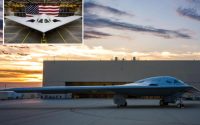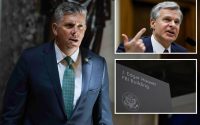Elon Musk foiled Ukrainian counteroffensive by turning off Starlink: book
Elon Musk foiled a Ukrainian submarine drone attack on a Russian naval fleet last year by turning off his Starlink satellite internet network near the Crimean coast to prevent a “mini-Pearl Harbor,” a biography of the billionaire claims.
Musk, 52, thought the Kremlin would respond to the attack with nuclear weapons — a fear based on conversations he had with senior Russian officials, according to an excerpt of Walter Isaacson’s “Elon Musk,” CNN reported Thursday.
As Ukrainian submarine drones carrying bombs approached the ships, they “lost connectivity and washed ashore harmlessly,” Isaacson wrote, according to the network.
Ukrainian officials then begged the SpaceX founder to turn back on his satellite internet constellation, the book reportedly said.
The book will be out next week.
Isaacson reportedly wrote that Musk spoke with national security adviser, Jake Sullivan, the chairman of the joint chiefs, Gen. Mark Milley, and the Russian ambassador to the US to address anxieties from Washington to Moscow..

Musk had agreed to provide Ukraine with Starlink satellite terminals after Russia disrupted the country’s communication system before it invaded the former Soviet territory in February 2022, but began to have “existential dread” of escalating the bloodshed by contributing to counterattacks, according to the tome.
“How am I in this war?” Musk reportedly asked Isaacson. “Starlink was not meant to be involved in wars. It was so people can watch Netflix and chill and get online for school and do good peaceful things, not drone strikes.”

In October 2022, Musk said he would no longer pay for his Starlink satellite internet service to operate in Ukraine after officials blasted his controversial proposal for Ukraine to end the war by conceding Crimea to Russia and remaining neutral, but never followed through on his threat.
He had posed his peace solution as a poll on his newly acquired Twitter platform – now rebranded as X – which drew praise from the Kremlin and scorn from Ukraine President Volodymyr Zelensky, who created his own Twitter poll asking users if they preferred a pro-Russian Musk or a pro-Ukraine version of the tech honcho.


